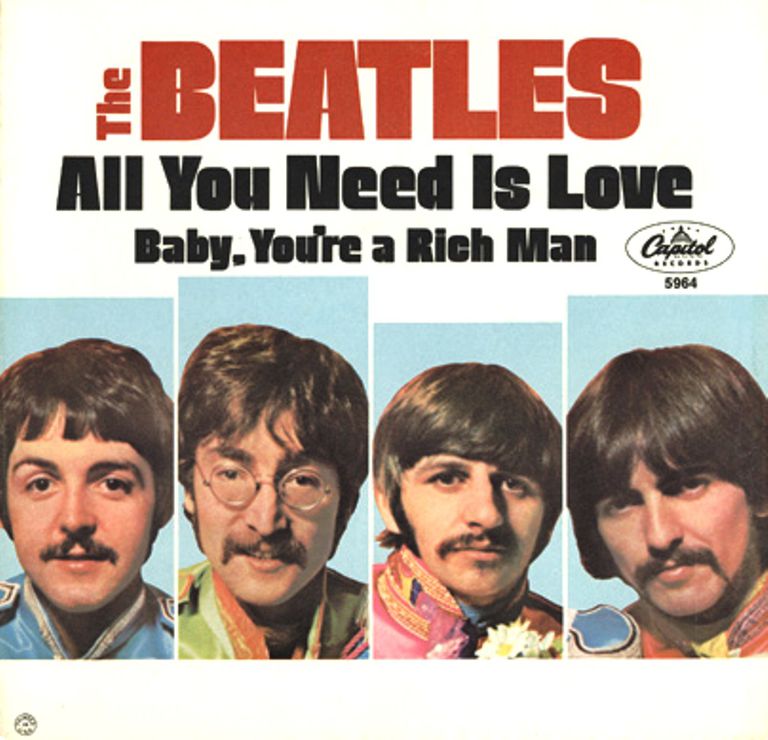August 19, 1967
- STAYED AT #1:1 Week
In The Number Ones, I'm reviewing every single #1 single in the history of the Billboard Hot 100, starting with the chart's beginning, in 1958, and working my way up into the present.
The Beatles were already a monstrously successful band before the summer 1967 release of Sgt. Pepper's Lonely Hearts Club Band. But that album brought them to a new level of cultural prominence -- one that began to transcend pop music or even celebrity. Sgt. Pepper was arguably the first event-album, the LP that wore its own experimentalism on its sleeve and forced any serious-minded people to reckon with what the Beatles were doing. You could not be a culturally informed person and dismiss the Beatles in 1967. It just wasn't possible. After Sgt. Pepper, the Beatles stopped being an extremely popular band of pop musicians. Instead, they became, more or less, goodwill ambassadors to the entire human race. That's not an easy position to be in.
Funny thing about Sgt. Pepper: None of the songs from the album were released as singles, so none of them went to #1, at least not for the Beatles. So the cultural impact of Sgt. Pepper only shows up on the Hot 100 in oblique ways. (Seven years later, Elton John took a cover of "Lucy In The Sky With Diamonds" to #1. Also, "Penny Lane," a non-album single from the Sgt. Pepper sessions, was another Beatles #1.) But a song that the Beatles recorded a couple of weeks afterthe release of Sgt. Pepper -- the band's first missive since taking on this uncharted new cultural role -- did make its way to #1. Even if that song was only barely a song.
"All You Need Is Love" was an event in the same way that Sgt. Pepper was. The Beatles had agreed to take part in Our World, the first-ever worldwide TV special. With state-of-the-art satellite technology, this show was going out to audiences in 24 countries at the same time, which was a new thing. Lennon knew that he was writing for a worldwide audience, so he consciously aimed to make his song as lyrically simple as possible. The idea was that a basic, direct message, repeated like an advertising slogan, would connect with the largest global audience possible. It's the same idea, more or less, that goes into Transformers movies leaving out character development for noisy robot battles. If you want as many people as possible to get what you're doing, you make it big and bright and simple.
John Lennon made it big and bright and simple. "All You Need Is Love" wasn't a protest song, though plenty of protesters were happy to use it as one. (And plenty of other protesters, it's worth noting, resented the simplistic naïveté that the song espouses.) Instead, it's a mantra, an idea of universal connection boiled down into a five-word phrase. And all the song's dazed harmonies and orchestral flourishes are there to support that idea, to further broadcast it into the world.
There's a lot going on musically on "All You Need Is Love." The intro is the clarion call of "La Marseillaise," the French Revolution fight song that became the national anthem. Behind the Beatles, George Martin's arrangement quotes composers from Bach to Glen Miller. Near the end of the song, various Beatles break into the chorus of "She Loves You," highlighting just how much both the Beatles and the world around them had changed in three short years. On the TV special, the Beatles' contemporaries -- Mick Jagger, Keith Richards, Eric Clapton, Marianne Faithfull, Keith Moon -- sat like kindergarten students and helped sing the song.
All these extra touches are cute, but they're indulgences. They're there for you to notice, for you to feel smart for noticing. The awkwardly clomping 7/4 tempo is another indulgence. On a pure musical level, I find "All You Need Is Love" to be an absolute chore -- a maddeningly repetitive campfire singalong with no central pulse, no sense of movement, no fire, no rigor. Plenty of people hear Lennon's gnostic verses -- "There's nothing you can do that can't be done / Nothing you can sing that can't be sung" -- as rich, mystical symbolic texts. I hear a guy using word-salad nothings to fill the space between choruses. This is probably my own cynicism at work, but I get nothing out of "All You Need Is Love" beyond that central five-word message.
So let's talk about that message. Maybe in that moment, when the world seemed to be tearing itself apart, it felt urgent and necessary -- these pop stars, bigger figures than anyone had ever seen, offering the planet a giant metaphorical hug. Maybe a song like that felt like it would change the world. But it didn't. The world is the world, and it'll take more than a dazed and self-impressed proto-"We Are The World" to shift global power dynamics or ease the mental load of living in a Darwinian nightmare. As I type this, the kids who sang along with "All You Need Is Love" are busy hoarding resources for the inevitable environmental cataclysm. Pretty soon, all we'll need is food.
GRADE: 3/10
BONUS BEATS: Here's the "All You Need Is Love" scene from the finale of the cultishly beloved late-'60s British sci-fi series The Prisoner, a scene that is both creepy and incoherent for those of us who have never seen the rest of the show:
BONUS BONUS BEATS: Here's Elvis Costello going fully solo to cover "All You Need Is Love" at 1985's Live Aid, another globally televised pop event:
BONUS BONUS BONUS BEATS: Here's the Flaming Lips' spacey cover of "All You Need Is Love," a bonus track included on some editions of their 2013 album The Terror:






